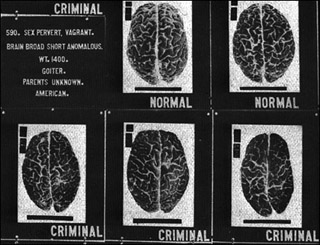Level:
Undergraduate
Instructors:
Prof. Caspar Hare
Prof. David Jones

Proponents of eugenics have sought to improve the human species through compulsory sterilization of criminals, the mentally ill, and others deemed social misfits. Such links between biology and destiny were intellectually fashionable in the 1920s, when some two-thirds of Americans were said to support such measures. (Photo courtesy of the U.S. National Library of Medicine.)
Course Highlights
This course features study guides for many of the assigned
readings.
Course Description
Many difficult ethical questions have arisen from the explosive growth of biomedical research and the health-care industry since World War II. When and how should doctors be allowed to help patients end their lives? Should embryos be cloned for research and/or reproduction? Should parents be given control over the genetic make-up of their children? What sorts of living things is it appropriate to use as research subjects? How should we distribute scarce and expensive medical resources? While some of these questions are genuinely new, products of rapid changes in biomedical technology, others have been debated for centuries. Drawing on philosophy, history, and anthropology, this course will show students how problems in bioethics can be approached from a variety of perspectives, with the aim of understanding how we have gotten where we are, and how we should decide where to go next.